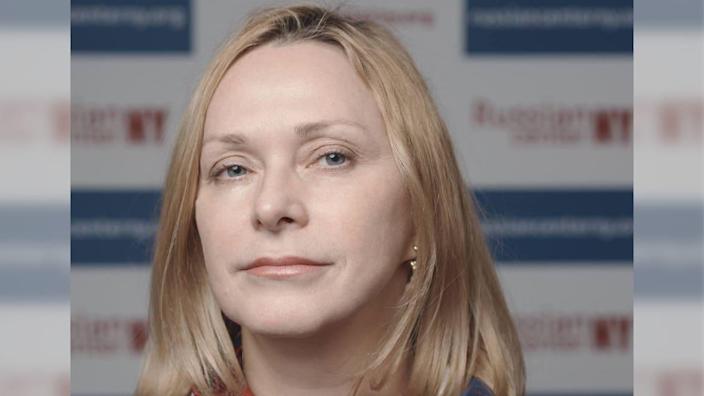
A 61-year-old woman holding both U.S. and Russian citizenship who ran an “I Love Russia” youth outreach campaign has been charged with acting as an illegal agent of the Russian government, federal prosecutors said Tuesday.
Elena Branson, who is alleged “to have corresponded with Putin himself,” remains at large after moving from New York to Russia roughly a year and a half ago, according to a Department of Justice press release. But before that, according to Assistant Attorney General Matthew G. Olsen, she was engaged for years “in a wide-ranging influence and lobbying scheme with funding and direction from the Russian government—all while deliberately leaving the American people in the dark.”
Branson faces six criminal counts, with Manhattan prosecutors detailing how she evaded registering with the U.S. government as a foreign agent—a charge sometimes described as “espionage-lite.” She is also charged for allegedly participating in a visa fraud conspiracy, and making false statements to the FBI.
The charges against Branson were announced hours after President Joe Biden said the U.S. would ban oil imports from Russia, which he said would effectively sever “the main artery” of the Russian economy. The White House, like many other countries, is continuing to pursue economic avenues of retaliation against Russia over its invasion of Ukraine.
Prosecutors have accused Branson of trying to hide the fact that the organization she founded and ran, Russian Center New York, was backed by tens of thousands of dollars in funding from the Kremlin. The Russian government also instructed her on what to do with that money, prosecutors said.
Branson was also the chair of the Russian Community Council of the USA (also known in Russian as the Coordinating Council of Russian Compatriots of the U.S. or its acronym KSORS). In her spare time, she held down a day job as an advisor to Manhattan Venture Partners, a merchant-banking technology firm, and before that, a financial strategist at Beryl Consulting Group, according to her LinkedIn.
The Daily Beast first reported in June last year that the FBI was investigating KSORS, questioning dozens of people associated with the group and conducting home searches. The council, a diaspora network with aims of popularizing Russian culture in the U.S., became increasingly aggressive and nationalistic after Russia’s annexation of Crimea in 2014. One former chair told the Beast that he had been unceremoniously pushed out by the organization after refusing to co-sign a statement in support of the occupation.
One expert told the Beast at the time that the gray area between celebrating cultural heritage and promoting political agendas made such investigations difficult. “The most difficult thing here is to distinguish where ‘innocent’ events dedicated to the popularization of Russian literature, language, a commemoration of dates from the common history of nations, and so on, end,” Jamestown Foundation analyst Kseniya Kirilova said, “and destructive ‘information operations’ begin.”
The extent and the outcome of the FBI’s probe is still largely unclear, but KSORS announced in November 2021 that it would be shutting down. In a statement, the group directly blamed the investigation, which it said had targeted “300 Russian community members,” for its closure. Calling the FBI’s tactics “reminiscent of the Cold War era,” KSORS also denied it had engaged in any political activities, according to RadioFreeEurope.
Branson was one of the KSORS community members who had her home raided by federal agents. She told state-funded news channel RT, whose American bureau shut down earlier this month, that agents had swarmed her home in the early hours of Sept. 29, 2020, confiscating computers, iPhones, and documents.
“The agents asked me to go out and searched the apartment for several hours,” she said, RadioFreeEurope reported. “They didn’t tell me what they were looking for.”
Amidst all the kerfuffle, Branson was also focused on her duties as president of Russian Center New York.
The organization, according to its own mission statement, “a community organization founded in 2012 to celebrate and share Russian cultural heritage for the enrichment of our community, improve relations between the American and the Russian people, protect the rights of Russian Americans and encourage their participation in public and cultural affairs of the U.S.”
The Manhattan federal prosecutors on Monday had a somewhat more succinct definition of it: “a Russian propaganda center.”
“The Russian government at its highest levels, up to and including President Vladimir Putin,” U.S. Attorney Damian Williams said, “have made known that aggressive propaganda and recruitment of the Russian diaspora around the world is a Russian priority.”
In direct pursuit of that goal, Williams continued, Branson “corresponded with Putin himself and met with a high-ranking Russia minister” before founding RCNY over a decade ago.
At one point operating out of a twelfth-floor, one-bedroom apartment on Central Park West in Manhattan worth around a million dollars, as the Beast reported last year, Branson and RCNY ran a “campaign to identify the next generation of American leaders, cultivate information channels, and shape US policy in favor of Russian objectives,” FBI official Michael J. Driscoll said.
Her campaign methods included pushing an “I Love Russia” campaign “aimed at American youths” and hosting an annual “youth forum.” Around 2019, she and RCNY also lobbied Hawaiian state officials to halt the name change of a formerly Russian fort on the island of Kauai. As part of the effort, Branson organized a trip for the Hawaiians to go to Moscow and rub elbows with their Russian counterparts, according to prosecutors.
The fort was not named by prosecutors, but it is likely Russian Fort Elizabeth, a designated monument built in 1817. Hawaiian activists were ultimately unsuccessful in changing its name to the native title of “Paʻulaʻula o Hipo.”
None of these things are considered illegal in isolation, but lobbyists for foreign governments working in the United States must declare their background to the Department of Justice, as part of an 83-year-old law called FARA, or the Foreign Agents Registration Act.
Branson “knew” that she was legally required to do so, prosecutors said.
But instead, she lied to federal agents who questioned her the same day her home was raided in 2020. In an interview, she “falsely claimed” that she had never been asked by the Russian government to coordinate meetings between American business and political leaders and Moscow officials, according to the Department of Justice.
Shortly after the interview, Branson fled to Russia. In an October with a state-controlled news channel in October the next year, Branson said she had left the U.S. under duress, adding it was likely she would have been arrested had she stayed.
Get the Daily Beast’s biggest scoops and scandals delivered right to your inbox. Sign up now.
Stay informed and gain unlimited access to the Daily Beast’s unmatched reporting. Subscribe now.




